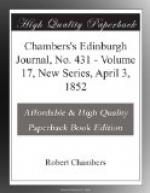a sum of money—about fifty pounds—scraped
together by thrifty self-denial during a dozen years
of servitude, amply compensated in the eyes of several
idle and needy young fellows for the unlovely outline
of her person; and Anne, with an infatuation too common
with persons of her class and condition, and in spite
of repeated warning, and the secret misgivings, one
would suppose, of her own mind, married the best-looking,
but most worthless and dissipated of them all.
This man, Henry Ransome by name, was, I have been
informed, constantly intoxicated during the first three
months of wedlock, and then the ill-assorted couple
disappeared from the neighbourhood of Itchen, and
took up their abode in one of the hamlets of the New
Forest. Many years afterwards, when I joined the
Preventive Service, I frequently heard mention of
his name as that of a man singularly skilful in defrauding
the revenue, as well as in avoiding the penalties
which surround that dangerous vocation. One day,
he was pointed out to me when standing by the Cross-House
near the Ferry, in company with a comparatively youthful
desperado, whose real name was John Wyatt, though
generally known amongst the smuggling fraternity and
other personal intimates, by the sobriquet of
Black Jack—on account, I suppose, of his
dark, heavy-browed, scowling figure-head, one of the
most repulsive, I think, I have ever seen. Anne’s
husband, Henry Ransome, seemed, so far as very brief
observation enabled me to judge, quite a different
person from his much younger, as well as much bigger
and brawnier associate. I did not doubt that,
before excessive indulgence had wasted his now pallid
features, and sapped the vigour of his thin and shaking
frame, he had been a smart, good-looking chap enough;
and there was, it struck me, spite of his reputation
as ’a knowing one,’ considerably more
of the dupe than the knave, of the fool than the villain,
in the dreary, downcast, skulking expression that
flitted over his features as his eye caught mine intently
regarding him. I noticed also that he had a dry,
hard cough, and I set down in my own mind as certain
that he would, ere many months passed away, be consigned,
like scores of his fellows, to a brandy-hastened grave.
He indicated my presence—proximity, rather—to
Wyatt, by a nudge on the elbow, whereupon that respectable
personage swung sharply round, and returned my scrutinising
gaze by one of insolent defiance and bravado, which
he contrived to render still more emphatic by thrusting
his tongue into his cheek. This done, he gathered
up a coil of rope from one of the seats of the Cross-House,
and said: ’Come, Harry, let’s be
off. That gentleman seems to want to take our
pictures—on account that our mugs are such
handsome ones, no doubt; and if it was a mildish afternoon,
I shouldn’t mind having mine done; but as the
weather’s rather nippy like, we’d better
be toddling, I think.’ They then swaggered
off, and crossed the Ferry.




